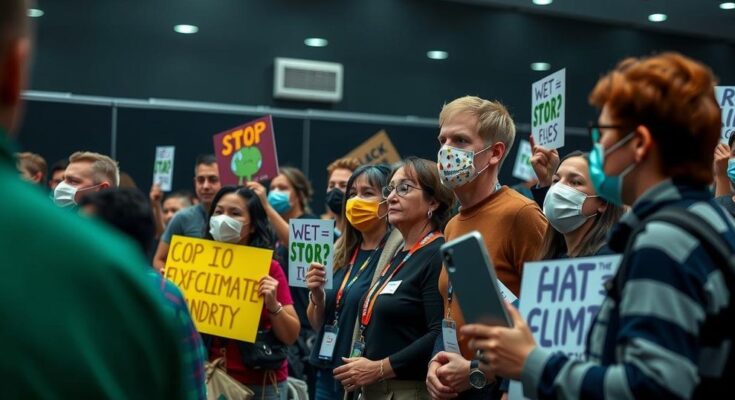At COP29, refugee activists urged for increased funding and support to tackle climate threats impacting displaced populations. The UNHCR report revealed that many refugees also contend with severe climate effects, underscoring the need for inclusive climate financing. Initiatives like the Refugees for Climate Action highlight the voices of displaced people in advocating for climate justice and adaptation resources.
At COP29 in Azerbaijan, refugee activists united to express the urgent need for increased funding and support in light of escalating climate challenges. The activists, representing forcibly displaced populations, highlighted that as the climate crisis intensifies, their lives grow increasingly precarious. Grace Dorong, a former South Sudanese refugee, articulated that climate-related hardships, such as drought and flood, are compounded by conflict, making survival more difficult for displaced individuals. During the event, UN High Commissioner for Refugees Filippo Grandi emphasized the real-world impacts of climate change for vulnerable populations like refugees. The latest UNHCR report reveals that a majority of the 123 million people uprooted by conflict are also grappling with adverse climate effects, indicating a critical intersection between climate hazards and displacement. Despite being among the most severely affected, displaced communities continue to be overlooked in climate financing, with only 2% directed towards extremely fragile countries. This discrepancy was noted by Grandi, who labeled it a profound injustice, urging development actors to broaden their focus to include these high-risk areas. In a promising development, UNHCR signed a memorandum of understanding with the Green Climate Fund to enhance climate finance access for displaced communities. This week also saw the formation of the Refugees for Climate Action coalition, bringing together climate activists from displaced backgrounds to elevate their voices in climate discourse and financing decisions. South Sudanese refugee and climate activist Opira Bosco Okot highlighted the potential of refugee-led initiatives, mend that the current funding structures remain short-term. He emphasized the need for transformative support to enable displaced populations to adapt and sustain their communities amidst climate despair. UNHCR Goodwill Ambassador Theo James supported these calls, sharing his encounter with refugees facing dire situations exacerbated by climate change, which forced them into a survival struggle. Okot and James’s mutual call at COP29 was for inclusive dialogue and policies that account for the unique challenges faced by refugees in the context of climate change.
The topic at hand revolves around the intersection of climate change and forced displacement, specifically in the context of COP29. As global leaders gather to address climate issues, refugees and displaced persons are increasingly affected by environmental challenges, exacerbating their already vulnerable situations. The UNHCR’s report reveals alarming statistics about the disproportionate impact of climate change on displaced populations and highlights the urgent need for targeted climate financing that includes the most at-risk communities in fragile settings.
In conclusion, the ongoing climate crisis has severely affected displaced individuals, necessitating urgent action and support from global leaders. COP29 served as a platform for refugees to articulate their challenges and advocate for increased climate financing. The formation of organizations like Refugees for Climate Action exemplifies the commitment of displaced persons to engage in climate discussions and push for equitable access to resources that can facilitate their adaptation and survival amidst these adversities.
Original Source: www.unhcr.org




